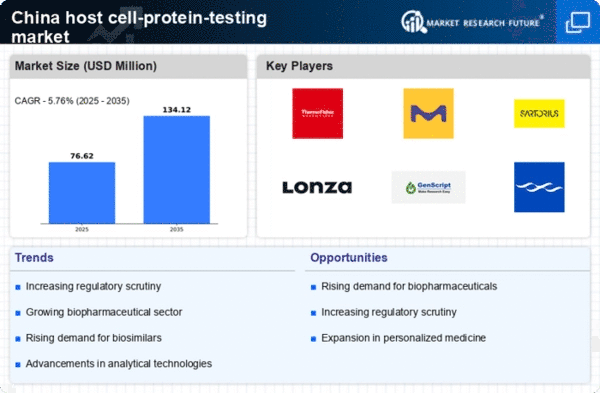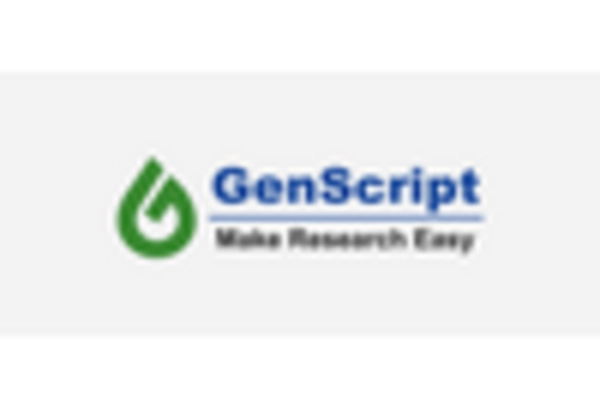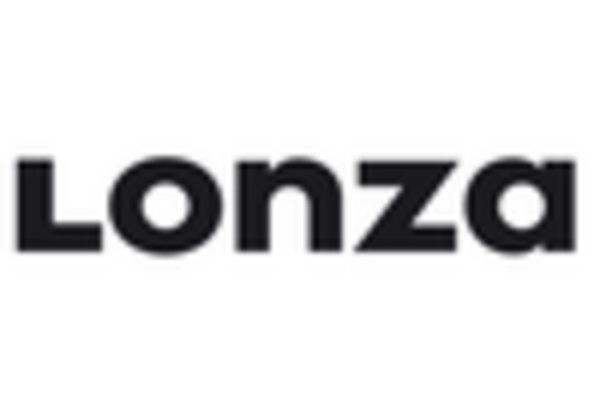Growing Focus on Quality Assurance
Quality assurance has become a paramount concern in the biopharmaceutical sector, significantly impacting the host cell-protein-testing market. As companies strive to meet international quality standards, the demand for rigorous testing of host cell proteins is expected to rise. In China, the emphasis on quality assurance is reflected in the increasing adoption of Good Manufacturing Practices (GMP) among biopharmaceutical manufacturers. This trend is likely to drive the need for comprehensive testing services, as companies seek to ensure that their products are free from contaminants and meet safety standards. Consequently, the host cell-protein-testing market is poised for growth as quality assurance becomes a focal point for industry stakeholders.
Regulatory Compliance Requirements
Regulatory compliance is a significant driver for the host cell-protein-testing market in China. The Chinese government has established stringent regulations governing the biopharmaceutical industry, which necessitate comprehensive testing of host cell proteins. These regulations are designed to ensure the safety and efficacy of biopharmaceutical products, thereby increasing the demand for testing services. In recent years, the Chinese National Medical Products Administration (NMPA) has intensified its focus on compliance, leading to a heightened need for host cell-protein testing. Companies that fail to meet these regulatory requirements may face severe penalties, further emphasizing the importance of testing in the host cell-protein-testing market.
Rising Investment in Biotechnology
Investment in biotechnology is a crucial factor driving the host cell-protein-testing market in China. The Chinese government has prioritized biotechnology as a strategic industry, leading to increased funding and support for research and development. In 2025, it is estimated that investment in biotechnology could exceed $50 billion, fostering innovation and growth in the sector. This influx of capital is likely to enhance the capabilities of companies involved in host cell-protein testing, enabling them to develop more advanced testing methodologies. As biotechnology continues to evolve, the demand for reliable testing services will likely increase, further propelling the host cell-protein-testing market.
Emerging Biopharmaceutical Startups
The emergence of biopharmaceutical startups in China is a notable driver for the host cell-protein-testing market. These startups are often at the forefront of innovation. These startups are often at the forefront of innovation, developing novel therapies and biologics that require extensive testing. As of 2025, it is estimated that the number of biopharmaceutical startups in China could reach over 1,000, creating a substantial demand for host cell-protein testing services. These companies are increasingly aware of the importance of quality control and regulatory compliance, which drives their need for reliable testing solutions. The growth of startups in the biopharmaceutical sector is likely to contribute significantly to the expansion of the host cell-protein-testing market.
Increasing Biopharmaceutical Production
The expansion of biopharmaceutical production in China is a key driver for the host cell-protein-testing market. This expansion is crucial for meeting the growing demand. As the country aims to enhance its biopharmaceutical capabilities, the demand for host cell-protein testing is likely to rise. In 2025, the biopharmaceutical market in China is projected to reach approximately $100 billion, indicating a robust growth trajectory. This growth necessitates stringent testing protocols to ensure product safety and efficacy, thereby propelling the host cell-protein-testing market. Furthermore, the increasing number of biopharmaceutical companies in China is expected to contribute to the demand for testing services, as these companies seek to comply with regulatory standards and ensure the quality of their products.
















